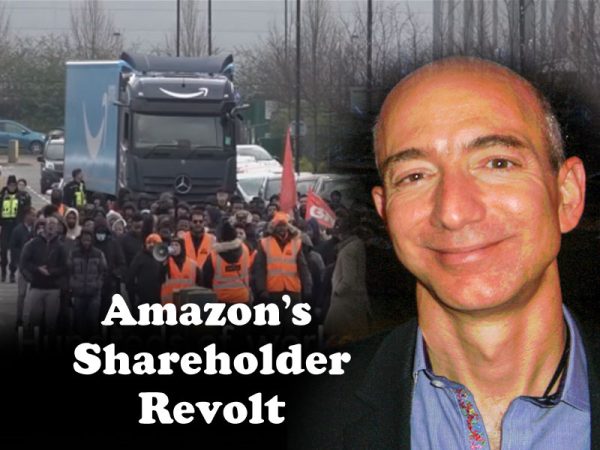
Amazon, the multinational technology company known for dominating e-commerce, cloud computing, and digital streaming, is facing a shareholder revolt as shareholders, including institutional investors and individual shareholders, express discontent with various aspects of the company’s business practices and governance. Calls for change and potential shifts in the company’s direction are emerging as shareholders voice their concerns.
Amazon's Environmental Impact
One of the key issues raised by shareholders is Amazon’s environmental impact. Shareholders are pushing for the company to take more aggressive action on climate change, including setting targets to reduce greenhouse gas emissions, increasing the use of renewable energy, and addressing packaging waste. “Amazon Employees for Climate Justice,” a group of Amazon employees, has been vocal in advocating for more aggressive climate action, staging walkouts and submitting shareholder proposals.
Amazon's Environmental Impact
Another area of concern for shareholders is Amazon’s labor practices. The company has faced criticism for its treatment of workers, including allegations of poor working conditions, inadequate wages, and anti-union activities. Shareholders are calling for improved labor practices, fair wages, and better working conditions for Amazon’s extensive workforce, which includes warehouse workers, delivery drivers, and gig workers. A recent unionization vote at an Amazon fulfillment center in Alabama has drawn significant attention, highlighting the ongoing debate around workers’ rights at the company.
Furthermore, there are concerns about Amazon’s market dominance and potential antitrust issues. As Amazon has grown into a behemoth in the retail and technology sectors, some shareholders are raising concerns about its market power and its impact on competition. Calls for increased regulatory scrutiny and potential antitrust action against the company have emerged to prevent anti-competitive practices and promote a more level playing field in the e-commerce industry.
Labor Practices at Amazon
In response to these concerns, Amazon’s management has taken steps to address shareholder demands. For example, in September 2019, Amazon CEO Jeff Bezos announced the company’s commitment to becoming carbon-neutral by 2040 and purchasing 100,000 electric delivery vans to reduce its carbon footprint. The company has also made efforts to improve labor practices, such as raising the minimum wage for its U.S. employees to $15 per hour and implementing safety measures during the COVID-19 pandemic.
Market Dominance and Antitrust Concerns
Last year, only 56% of Amazon’s shareholders approved the executive pay packages, which is a significantly low number compared to the typical approval rate of 70% or higher for companies in the S&P 500. This reflects a high level of investor dissatisfaction, and it is considered one of the most severe instances of shareholder discontent in Amazon’s history since it went public in 1997.
The reason for this rebuke was primarily focused on the stock awards granted to top executives, particularly the new CEO Andy Jassy. Jassy, who took over from Amazon’s founder Jeff Bezos in 2021, received a staggering $212 million in stock awards, which was seen as excessive by many shareholders. The company argued that the stock awarded to Jassy would be granted gradually over a long period of time, with more than 80% of the shares becoming available to him between 2026 and 2031.
Shareholder Revolt and Activism
The proxy statement revealed that the concern raised by shareholders was not solely about the size of the stock award. Following the vote, Amazon’s board of directors disclosed that they had held meetings with the company’s biggest shareholders, who collectively own 33% of Amazon’s stock. Some of these major investors include The Vanguard Group (6.6%), BlackRock (3.7%), SSgA Funds Management (3.3%), Fidelity (2.7%), and T. Rowe Price (2.1%).
Some shareholders argue that these actions are insufficient and that more needs to be done to address the concerns raised. This has led to increased shareholder activism, with institutional investors and individual shareholders using their voting power to push for changes at Amazon’s annual shareholder meetings. Shareholder proposals related to climate change, labor practices, and antitrust issues have gained traction and received significant support from shareholders.
Potential Changes for Amazon
The shareholder revolt at Amazon reflects a broader trend of increased shareholder activism and corporate social responsibility expectations from investors. Shareholders are increasingly using their voting power to advocate for changes in company policies and practices, and companies are being held to higher standards when it comes to environmental, social, and governance (ESG) issues. Shareholders are demanding that companies prioritize sustainability, social responsibility, and ethical governance in their operations.
The potential changes ahead for Amazon are significant. The company may need to further enhance its environmental efforts, including setting more ambitious emissions reduction targets, investing in renewable energy, and improving waste management practices. It may also need to address labor practices, including ensuring fair wages, improving working conditions, and respecting workers’ right to unionize. Additionally, Amazon may face increased regulatory scrutiny and potential antitrust actions, which could impact its business practices and market dominance.
Overall, the shareholder revolt at Amazon reflects growing concerns from investors about the company’s environmental impact, labor practices, and market dominance. Shareholders are demanding change and potential shifts in the company’s direction, as they use their voting power to push for improved sustainability, labor practices, and governance standards. Amazon may need to take further action to address these concerns and adapt to the changing expectations of shareholders and investors.




